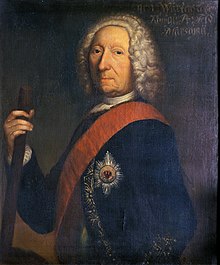Cabinet of three counts


The Drei-Grafen-Kabinett , also known as Die Drei Wehs or Das dreifache Weh because of the first letters of their names , was a circle of favorites around King Friedrich I, consisting of Court Marshal August David Graf zu Sayn-Wittgenstein , Field Marshal von Wartensleben and the upstart Johann Kasimir Kolbe von Wartenberg , who, without being a real institution, significantly influenced and shaped Prussian politics from 1702 to 1710.
The triple woe
After the fall of President Eberhard von Danckelman at the end of 1697, the influence of Kolbe, who had been in the Brandenburg civil service since 1688, increased. At the coronation of Frederick I and in state affairs, he attested Friedrich the next. He did his best to encourage Frederick III's inclination to become king and thus gained the greatest influence on state affairs. After the coronation he was given the title of Imperial Count and was appointed Prime Minister in 1702 .
Friedrich trusted him in all questions and was glad to have gotten rid of Danckelman's strict regime. After Wartenberg had gradually eliminated his competitors at the court, he filled important court positions with his devoted henchmen. He had the post of the Real Secret Council filled by Field Marshal von Wartensleben, who was devoted to him and who was also governor of Berlin. Count von Wittgenstein, a selfish man, received the financial and chamber affairs.
The work of Wartenberg was favored by the accumulation of offices, which allowed him to switch and rule at will. In addition to Prime Minister and Head of the General Economics Directorate, he was also Marshal of the Kingdom of Prussia, Protector of the Royal Academies, Chancellor of the Order of the Black Eagle , Chief Stable Master, Supervisor of the Royal Palaces, Chief Captain of all casket offices and Postmaster General, all in personal union .
Wartenberg in particular, also in the position of chief chamberlain , and Wittgenstein mainly managed for their own pockets during their time, which completely plundered Prussia . It was part of Wartenberg's policy to come up with new, superfluous offices. In order to meet Frederick's pompous needs, he also constantly invented new taxes that put a heavy burden on the country and its people. In addition to the traditional contribution , a property tax , the excise tax , a consumption tax, was driven up. There were also special taxes, such as a poll tax. A permit had to be obtained for the consumption of tea, coffee or cocoa, which cost two thalers a year. A wig tax, hat, boot, stocking and carriage tax was introduced. Young girls had to pay maiden tax of 2 groschen per month on their virginity until they were married . Finally, salt consumption was also taxed, which hit the poor in particular.
It was not until 1709 that plague and famine ravaged the Kingdom of Prussia to a catastrophic extent that Frederick I dropped the cabinet of three counts following the publication of the report by the Secret Court Chamber and the Domain Commission on the situation in Prussia. First he had Wittgenstein arrested. His machinations with insurance fraud for fire and fire protection as well as the unpopular salt tax that was charged to him caused him to fall. The trial against Wittgenstein, which began in 1711, was not opened at the behest of Friedrich. Waiting life remained, but was robbed of its power. He was the only one of the three who also enjoyed his favor under Friedrich's successor Friedrich Wilhelm I , who radically broke with his father's regime, even if the king had his grandson Hans Hermann von Katte beheaded in 1730.
Individual evidence
- ↑ a b Gustav Adolf Harald Stenzel, p. 180.
- ↑ a b Günter Barudio, p. 214.
- ↑ Prussia Year Book, p. 83.
literature
- Samuel Buchholz : Attempt a history of the Churmark Brandenburg. Fourth part: New story. Berlin 1767, pp. 350-353.
- Werner Schmidt: Friedrich I. - Elector of Brandenburg King in Prussia. Heinrich Hugendubel Verlag, Munich 2004.
- Prussia Year Book - An Almanac. MD-Berlin, Berlin 2000.
- Günter Barudio : World History - The Age of Absolutism and the Enlightenment 1648–1779. Volume 25, Weltbild Verlag, Augsburg 1998, ISBN 3-89350-989-5 .
- Gustav Adolf Harald Stenzel : History of the Prussian State. Third part, Verlag Friedrich Perthes, Hamburg 1841.